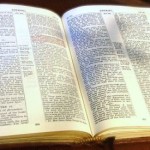We run our website the way we wished the whole internet worked: we provide high quality original content with no ads. We are funded solely by your direct support. Please consider supporting this project.
What is the significance of Ezekiel 33:13–15?
“[W]hen I say to the righteous he will surely live, and he so trusts in his righteousness that he commits iniquity, none of his righteous deeds will be remembered…he will die. But when I say to the wicked, ‘You shall surely die,’ and he turns from his sin and practices justice and righteousness, if a wicked man restores a pledge, pays back what he has taken by robbery, walks by the statues which ensure life without committing iniquity, he will surely live; he shall not die.”
How are we to understand the Lord telling a righteous person “you shall surely live” or telling a wicked person “you shall surely die” if we also believe that at that very moment the Lord was perfectly certain that the righteous person he’s speaking to would not live (for he eternally foreknew they’d fall) and that the wicked person he’s speaking to would not die (for he eternally foreknew they’d repent)? Declarations are truthful only if they reflect sincere beliefs. But if God’s knowledge about a person’s fate is eternally settled, then any declaration he gives which goes against this knowledge is insincere.
If we grant that when the Bible depicts God as changing his mind it depicts him as he truly is and not simply as he appears to us, these problems disappear. In good faith, the Lord tells the righteous they shall live and the wicked they shall die, for this is what the Lord truly believes about them at the time of the declaration. If they change, however, his belief about them truly changes, and so his sincere declaration about them changes.
Category: Q&A
Tags: Open Theism, Q&A
Topics: Open Theism
Verse: Ezekiel 33
Related Reading

Answering an Objection to a Cross-Centered Approach to Scripture
Through Greg’s Facebook and Twitter, we’ve been getting some great feedback and questions regarding his cross-centered approach to Scripture. Several have voiced questions similar to the reader’s (below), so we thought it would be helpful to post Greg’s answer here on his blog.

Doesn’t Psalms 139:16 refute the Open View of the future?
One of the passages most frequently cited in attempts to refute the open view of the future is Psalm 139:16. Here David says that God viewed him while he was being formed in the womb (vs. 15) and then adds: “[Y]our eyes saw my unformed body. All the days ordained for me were written in…

How do you respond to 1 Timothy 1:9?
“[God] saved us and called us with a holy calling, not according to our works but according to his own purpose and grace. This grace was given to us in Christ Jesus before the ages began…” Compatibilists sometimes appeal to this verse to support the view that God determined who would (and thus who would…

Are you an annihilationist, and if so, why?
Annihilationism is the view that whoever and whatever cannot be redeemed by God is ultimately put out of existence. Sentient beings do not suffer eternally, as the traditional view of hell teaches.I’m strongly inclined toward the annihilationist position. The reason is that it strikes me as the view that has the best biblical support. I’ll…

If God is already doing the most he can do, how does prayer increase his influence?
Question: If God always does the most that he can in every tragic situation, as you claim in Satan and the Problem of Evil, how can you believe that prayer increases his influence, as you also claim? It seems if you grant that prayer increases God’s influence, you have to deny God was previously doing…

How do you respond to 1 Timothy 4:1–3?
“…in the later times some will renounce the faith by paying attention to deceitful spirits and teachings of demons, through the hypocrisy of liars whose consciences are seared with a hot iron. They forbid marriage and demand abstinence from foods…” New Testament authors considered themselves to be living “in the later times” (e.g. Acts 2:17;…
